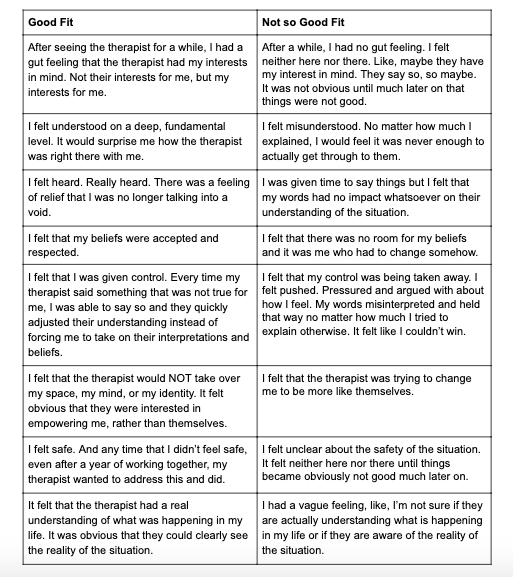How to Find the Right Therapist
Finding the Right Fit: Is This Therapist For Me?
Let me be blunt. I haven’t always believed in therapy. Or therapists, for that matter. Coming from a cultural background that distrusts this profession, it was something that I felt weary about. Something that I tried to avoid.
You might be surprised to hear that, since in my last blog I talked about my journey to meditation and wellness and how therapy played a big role in my recovery. But it wasn’t my first therapist who was able to help me, it was my second. And that’s the story I want to share with you today.
My very first attempt to see a therapist was when I was in graduate school in Michigan. I was two months away from getting my diploma and I was having a breakdown. The severity of my negative feelings overcame my weariness of CAPS (the counseling and psychological services available to students), and I decided to go in.
I walked into the office and was handed a clipboard with some papers to sign. If I was weary before, now I was on high alert. What was I signing? Who will have access to this? Will my future employers know that I’d gone in to see a therapist? Will I be hirable after this? Will people think I’m crazy?
Out of fear, I read every line of the document and there was a paragraph that was murky to me. It said something about how my information could be released but how and to whom, it wasn’t clear to me at all. I walked up to the front desk and asked the person sitting there. The response they gave me was, “It’s right there, just read it.”
I tried one more time... “So sorry, I did read it and still don’t understand. Can you explain what it means?”
“Just read it! It’s written right in front of you” was what I got in return.
Their response PISSED me off. What kind of behavior is that?! In a therapy office no less?!?!
I left the clipboard on their desk, exited the building, and stormed off to my best friend’s apartment to share my anger and disbelief of what had just happened. In a funny way, the shock of that interaction distracted me from the breakdown that I had been experiencing.
Afterwards I gathered myself once again in true Ross fashion.
I put aside any feelings that “got in the way” and graduated.
Fast forward a year and a few months, I was not so fine. I found myself hyperventilating and crying on the floor next to the front door of my San Francisco apartment that I shared with my ex-partner. After spending a week away from that place, during which I felt relaxed and at ease, returning to the toxic relationship was, um, not fun. It was at this point, when I was about to call it quits, my ex-partner pleaded with me to stay, saying that we could go to couples therapy. Despite everything, I agreed. And thus started seeing my first therapist.
It went horribly. Talk about life kicking you when you’re down. It was like getting into a terrible car accident with the romantic relationship, then renting a car and getting into the same terrible car accident the minute you leave the lot with the therapy. Quite the double whammy.
To put it in tiniest of nutshells, it did not work out with the couples therapist who missed the context of what was happening and made things much worse for me.***
The couples therapist did suggest one great thing. That I go see an individual therapist, and I did that. This was now my second therapist and it felt very different. In the best possible way.
While everyone’s experience of therapy is different, there are fundamental things that should be happening in your therapy room: you should feel heard, understood, safe, and respected. Your therapist should make these feelings obvious in you. Not leave you with vague feelings like “maybe”, “sort of” or “I’m not sure”. And if you ever do feel unsure or scared or uneasy, like I did even after seeing the same therapist for a year (hey, I was pretty scared of therapists after my first couple of experiences), the therapist should welcome these feelings and be able to effectively address them.
To draw some lines in the sand and give you something to go off of when gauging the fit of your therapist, I compared and contrasted my experiences below.
So if you are looking for a therapist or currently have one, think about whether you would fill out the first or second column, something in between, or columns even more to the left or to the right of the ones above. Doing so may help you assess whether or not the therapist is a good fit for you.
Now, let’s say that you found a therapist that is a good fit for you. How do you know if the therapy is actually working? Just because the therapist is a good fit, does it automatically mean that you are getting better? Stay tuned to next week’s blog as we dive into this topic.
In the meantime, take a moment to cultivate positive emotions for yourself and others using this short Loving Kindness meditation.
Click here to learn more about The Individual Reset.



